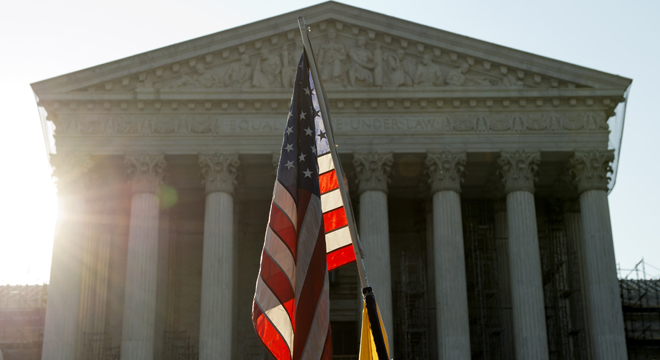In a major case next spring, the Supreme Court will consider whether it’s constitutional for the federal government to refuse to recognize same sex marriage.
The justices have several options on how to come down in the Windsor v. United States challenge to Section 3 of the 1996 Defense of Marriage Act, which denies federal benefits to gay couples that are legally married in their states.
Earlier this week TPM gamed out the potential outcomes on Proposition 8, the other big same sex marriage case the Court decided to hear regarding whether states like California can outlaw gay marriage.
Here’s how legal experts say they might rule in the unrelated DOMA case, which deals with federal law.
1) Strike Down DOMA
The Court could determine that Section 3 of the Defense of Marriage Act violates the Constitution’s guarantee of equal protection for all under the law. In that scenario, gay couples in states like Massachusetts and Maine would begin to receive federal perks for married couples such as retirement and tax benefits.
The reach of such a decision would be important for future gay marriage battles.
“Of course, if they strike it down they could write the opinion narrowly, just about Section 3 of DOMA, or broadly in a way that recognizes a constitutional right to marriage equality,” says Erwin Chemerinsky, a constitutional law professor at UC-Irvine.
2) Uphold DOMA
The majority of justices could find Section 3 of DOMA valid under the Constitution. That would enshrine a status quo where gay married couples in states where same sex marriage is legal are treated differently than their straight counterparts under federal law.
Along with being denied tax and Social Security survivor benefits, gays would continue to not have the ability to sponsor foreign spouses for legal immigration status, as straight married couples are permitted to do.
3) Punt
The Supreme Court could potentially dismiss the case on procedural grounds. The case is unusual in that the Obama administration — the designated defendant for a federal law — has refused to vouch for DOMA. House Republicans retained counsel to defend the law. The justices may decide that the case was not properly defended and remand it to the lower courts to try again.
“One possibility is that the Court avoids the DOMA question entirely,” said Adam Winkler, a law professor at UCLA. “The Court could say that the House committee that’s defending DOMA is not a proper party to the case. Because the Obama administration has refused to defend DOMA, this would mean that the case would be sent back to the lower courts.”
Eventually, however, the case is likely to find its way back to the Supreme Court.






